Gyldiv
| Public organisation (SP) | |
| Industry | Video games |
| Founded | 1987 |
| Headquarters | Mayt, Envadra , |
Area served | Gylias |
| Products |
Gyldiv SP is a Gylian public organisation that manufactures video game consoles.
Gyldiv has a monopoly on the manufacture of consoles in Gylias. It was established to consolidate console standards, with a view towards ensuring maximum compatibility and open platforms. It has had a vital role in the development of Gylian gaming.
History
Due to the computer industry's stagnation during the wretched decade, imported video game consoles had become popular, particularly from Kirisaki and Akashi. Prompted by a consumer complaint, an administrative court ruled in 1986 that the existence of multiple console versions of the same game constituted price gouging, pushing the Filomena Pinheiro government to act.
Gyldiv was founded in 1987 and assumed a monopoly on manufacturing consoles. Its name came from the abbreviation Gylias divertissement (French for "Gylias entertainment").
Its early years were difficult. It spent the late 1980s consolidating the Gylian console market. Its first console, the Exo, was hastily developed, and served more as a lowest common denominator for unifying existing console standards.
GameCentral wrote that the company "essentially tore apart and reassembled Gylian gaming from scratch". By taking over manufacturing consoles, it destroyed first-party developers in Gylias, leaving a market dominated by independent and third-party developers. The impact of the monopoly essentially closed the Gylian console market, devastating importers and giving domestic developers market dominance.
The first Directors of the Management Board, Alexão Simões and Sasti Şaréy, had a massive impact on the company's culture and workings. Their contrasting personalities made them a formidable team. Sasti was refined and prudent, and envisioned Gyldiv as being to consoles what Gylmuse was to music. Alexão, charismatic and more aggressive, envisioned Gyldiv as an Arts Council for gaming, using its monopoly and regulatory powers to shape the industry. She pushed for Gyldiv to adhere to the Good Practices Code from the beginning to build up public trust.
Development for Gyldiv's second console was ambitious and leisurely, based on input from developers and players. Released in 1990, the Ion was a massive hit, and revolutionised Gylias' gaming industry. It was the first 16-bit console, boasting improved graphics and audio capabilities. It helped turn video games from a niche hobby to a national pastime, and became a symbol of the renewed national optimism of the 1990s, coinciding with a rejuvenated economy and a second Gylian Invasion.
The company continued to refine and develop the Ion throughout the decade, becoming a key participant in the Tyranian console war. Notable accessories included the Ion CD (1992), which added CD-ROM support, and the Satellaview (1995), which allowed internet access. It also released its first handheld game console, the Orthogon, in 1995.
Having used the Ion CD as a bridge, Gyldiv released the post-64-bit Dreamsphere in 2000. This was another significant success, taking full advantage of CDs and DVDs as the main storage medium, and online gaming capabilities.
Alexão and Sasti retired as Directors in 2002, which some saw as the end of the company's "golden age". Gyldiv continued refining its existing consoles and developing new ones. It settled on a decade-based schedule, releasing new consoles at the start of a new decade, and new handhelds 5 years after.
Mission
Gyldiv's mandate is to ensure affordability of consoles, accessibility and openness as a platform, compatibility with personal computers, and conduct research for the benefit of Gylian gaming technology.
As the only company in Gylias legally allowed to manufacture consoles, it pursues market clearing prices for the domestic market, and surveys consumers and developers to plan future research and development.
It also has some export operations abroad. It does not use regional lockout mechanisms, and is known for its manufacture of game backup devices and official PC emulators, support for discontinued consoles, and use of free and open-source software, making it a notably friendly platform for hobbyist and homebrew development.
Gyldiv also has a stranglehold on video game importation and localisation to Gylias, and in this regard is notorious for its insistence on sometimes drastic changes to match Gylian cultural sensibilities, particularly in regard to religion and gender and sexuality.
Organisation
Gyldiv is a public organisation, overseen by the Ministry of Culture. It is organised by workers' self-management, and managed by the Management Board.
The Management Board has 20 members, half of which are elected by workers' assemblies, and the other half are chosen through sortition from the populace in order to represent the interests of Gylian game players. The worker assemblies also elect a 25-member Supervisory Board to oversee the workings of the Management Board.
The Management Board is accountable to the Supervisory Board and to the Ministry of Culture. It sets objectives and strategy, assesses the performance of the company, addresses complaints, and appoints the Director and the Chair of the Management Board.
Elected members of the Management Board are elected to a five-year term, with no term limits. Allotted members of the Management Board are chosen yearly. Members of the Supervisory Board are elected annually without the possibility of immediate reelection.
Gyldiv's headquarters are in Mayt, Envadra.
Products
Home consoles
Exo
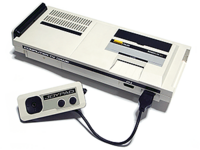
The Exo was released in 1987. It was a 8-bit console. It was notable for its hasty development and underwhelming reception. Mainly remembered for its role in setting off the uprooting and reconstruction of Gylias' console market, it is regarded as Gyldiv's best-known failure.
Ion
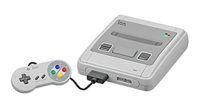
The Ion was released in 1990. It was a 16-bit console. It was notable for its drastically improved graphics and hardware capabilities, and is regarded as the peak of 2D, sprite and pixel art-based gaming.
It had two accessories: the Ion CD, released in 1992, and the Satellaview, released in 1995.
Dreamsphere

The Dreamsphere was released in 2000. It was a post-64-bit console. It heralded the leap from 2D to 3D computer graphics, and harnessed the internet for a fully online gaming experience.
It had one accessory: the VMU, released together with the console.
Aura
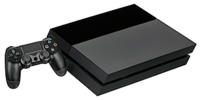
The Aura was released in 2010. It is Gyldiv's current console. It is notable for its support for online and wireless gaming, and mobile gaming and multimedia capabilities.
Handheld consoles
Orthogon
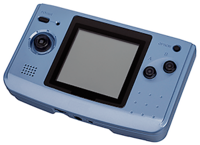
The Orthogon was released in 1995.
Miniplay
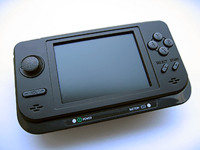
The Miniplay was released in 2005.
Kinesys
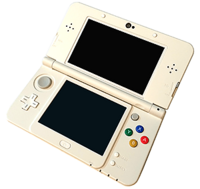
The Kinesys was released in 2015.
